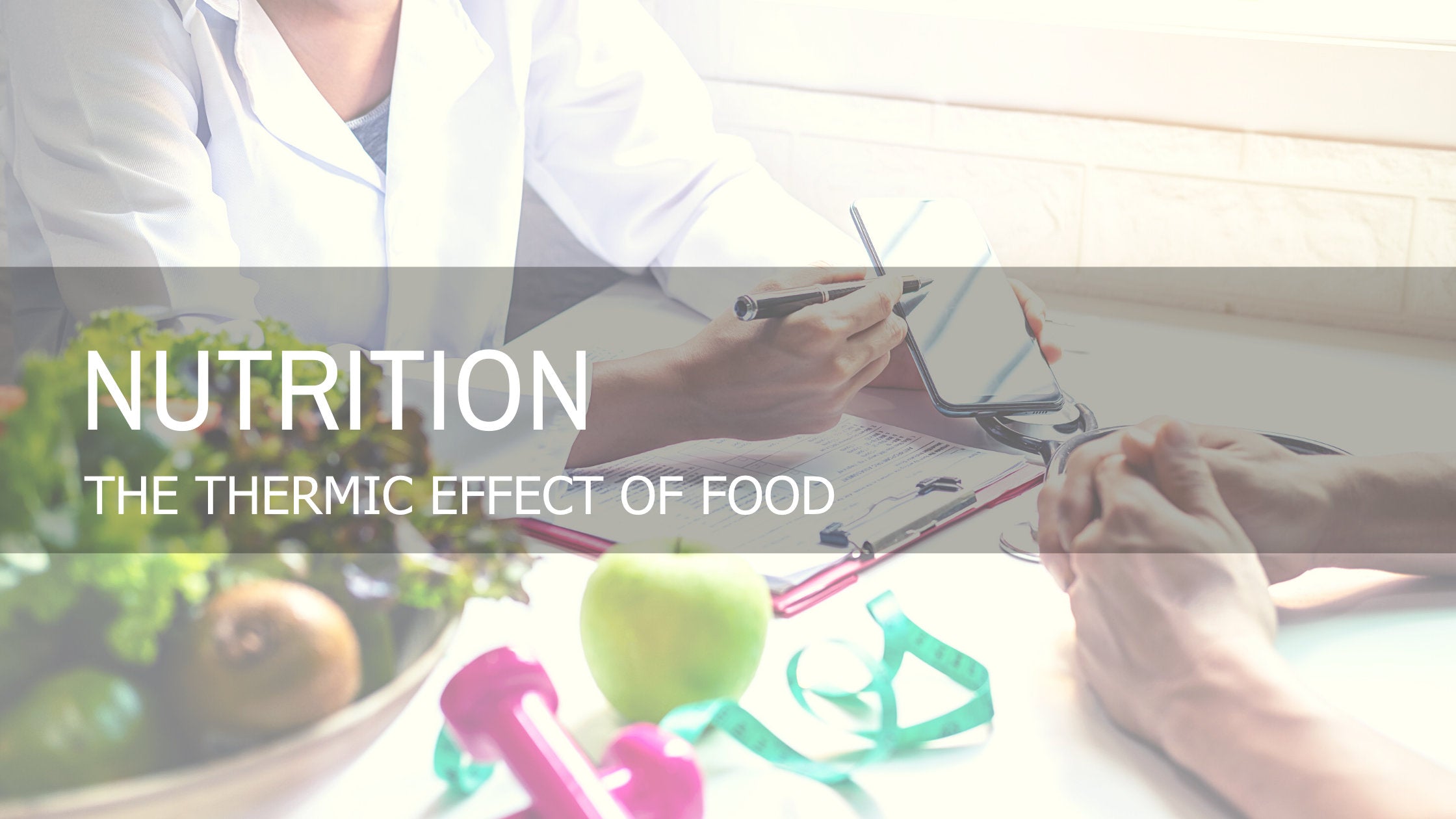
May 26 , 2021
0 Comments
Metabolism | The Thermic Effect of Food
The types of nutrients that we take in daily are important, but so is how and when we take them in. Food type and timing matters!
So, what is food really?
Food is composition of nutrients that provide building blocks and energy for your body.
Nutrients include:
- Macronutrients: Carbohydrates, Protein, Fat
- Micronutrients: Vitamins & Minerals
The energy provided by food is measured in calories. A calorie is a unit of heat energy or the energy value of food.
Carbohydrates = 4 calories per 1 gram
Protein = 4 calories per 1 gram
Fat = 9 calories per 1 gram
Thermic Effect of Food
The Thermic Effect of Food refers to the amount of energy expended by the body in processing food intake for use and storage. When you eat a whole food, your body must do work and burn calories to break food down and absorb the nutrients from it. Some foods are much more energy expensive to ingest than others. Protein for example requires much more energy than fat to metabolize. When drinking your food, such as in the form of a juice or smoothie, the machine used to make that drink did all the “mechanical digestive” work.
So what does this mean for you? Eating whole food burns more calories in the digestive process than drinking food. Also, eating a whole piece of food takes longer to digest than a drink, keeping you fuller longer.
Gastric Emptying Cycle
Different nutrients work their way through the digestive tract at different rates.
- Carbohydrates – The body can start extracting energy within 15-30min. Full digestion can vary depending on the carbohydrate source and its glycemic load.
- Protein – Take longer than carbohydrates and will generally take longer than 1.5 hours to digest. Whey protein in viscous liquid form takes approximately 1.5 hours to digest. So, you can imagine that protein in whole foods will take longer.
- Fat – Takes the longest to digest, and could take anywhere from 24 to 72 hours to fully digest, depending on the composition of the rest of the meal.
Full gastric emptying is dependent on the full composition of the meal being consumed. A meal higher in carbohydrates will be digested and absorbed much faster than a meal higher in protein or fat. A fully balanced meal should have the right distribution of nutrients that cover the whole scope of digestion and absorption rates. It could take anywhere between 24 to 72 hours for all parts of a fully balanced meal to make it through all parts of the digestive tract (not just the stomach).
Micronutrients at a glance
Vitamins
- Water Soluble
- Vitamins B1, B2, B3, B5, B6, B7, B9, B12 & C
- Are absorbed and excreted much faster
- Excess has a short half-life and are not stored for long periods of time.
- Fat Soluble
- Vitamins A, D, E & K
- Absorb better when in the presence of fat, thus they take longer to be absorbed and excreted.
- Excess has a longer half-life and will be stored for longer periods of time.
Minerals
Examples include: Calcium, Phosphorus, Magnesium, Sodium, Chloride, Potassium, Iron, Zinc, Iodide, etc. These minerals can be found in and extracted from a variety of different foods and beverages. They are used in a variety of different processes in the body, some of which we will discuss in later weeks. The body will digest and absorb these micronutrients more efficiently when they are coming from natural food choices, as opposed to from an artificial supplement.
We come back to the importance of knowing what your goal is and how you can fuel yourself to match that goal.
We are finding as the weeks go on that, although the amount of energy or calories that you are taking in is important, it is not the only component that needs to be considered. The source of nutrients, balance of meals, how you are consuming nutrients and the timing of food all matters.
Things that are important for everyone to consider, no matter your goals:
Your calorie balance needs to be in line with your goal. Your macronutrient and micronutrient breakdown needs to be considered. It is important to balance your meals and spread your energy intake out evenly throughout the day. Things that hold even more importance when your goal is to lose weight are: Eating a whole piece of food will burn more calories than drinking nutrients. Food timing is important to make sure nutrients are spread out and can be more efficiently processed by the body.
Take-Aways
Figure out the direction of your energy balance and see if it matches with your goals as it relates to weight and performance. Get your Resting Metabolic Rate Tested HERE. Start paying attention to the balance of your meals and make sure there is a good distribution of macro and micro nutrients and spread your food intake out more evenly throughout the day, giving your body time to empty your stomach and be further along in the digestive process before your next meal.
Goals
Complete another food journal for at least 3 days:
- This time take extra notes
- What were the timing of meals and snacks? What was the distribution of calories across your meals?
- Macronutrient break down of individual meals and for the whole day
- Number of fruits and vegetable serving taken in during the day
If you are using a tracking application many of these things are automatically tracked.



